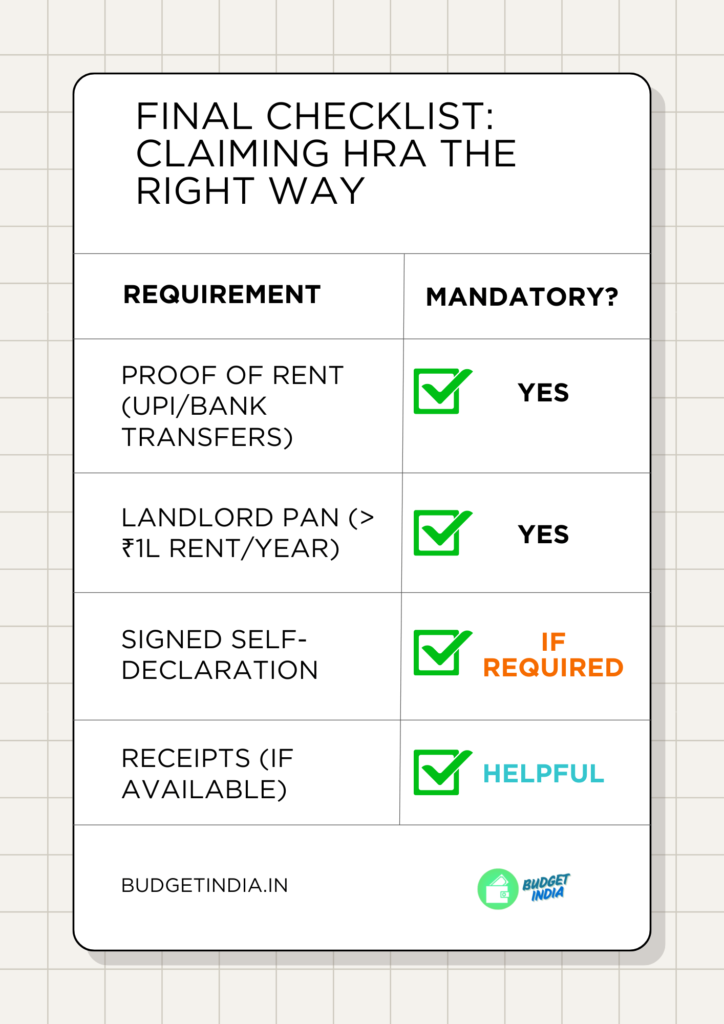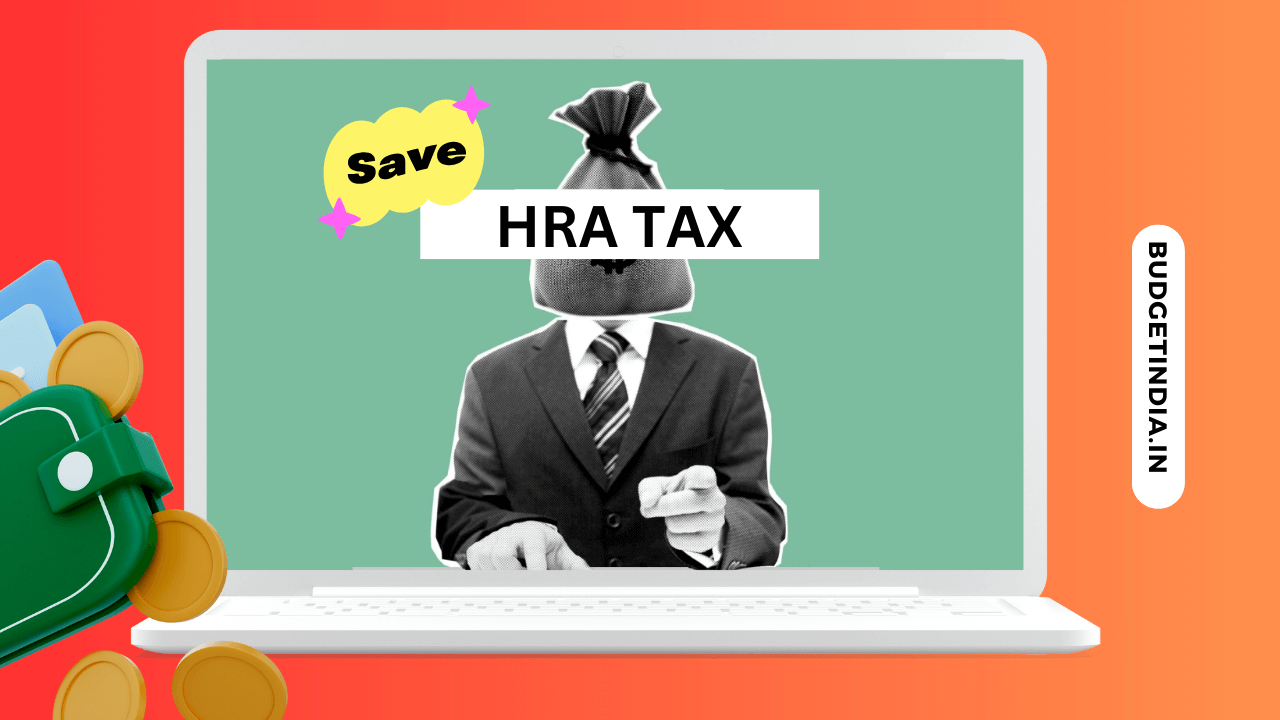Paying rent but don’t have a rent agreement or formal receipt? Don’t worry. You can still claim House Rent Allowance (HRA) and legally reduce your tax liability.
Many of our readers have asked about claiming HRA without a rent agreement — here’s what our experience tells us…
Under Section 10(13A) of the Income Tax Act, salaried individuals who rent accommodation can claim HRA exemptions—even if the process gets tricky due to documentation gaps.
What is HRA and How Does It Work?
HRA is a salary component provided to employees who live in rented accommodation. It’s partially exempt from tax and can significantly reduce your overall tax outgo.
HRA Exemption is Calculated Based on Three Factors:
- Actual HRA received from employer
- 50% of basic salary (for metro cities) or 40% (for non-metro cities)
- Rent paid minus 10% of basic salary
The lowest of the above three is exempt from tax.
Breaking Down HRA & Tax Advantages
HRA is a key component of your salary that offers tax relief when you rent a home. The exemption is calculated based on:
- Actual HRA received from your employer
- 50% of basic salary for metro cities or 40% for non-metro locations
- Rent paid minus 10% of your basic salary
The smallest of these amounts is exempt from tax. However, complications arise when landlords refuse to provide rent receipts. Here’s how you can still make your claim.
Example Calculation:
Let’s assume you work in Bangalore (metro city) and have the following salary details:
- Basic Salary: ₹50,000 per month
- Actual HRA received: ₹20,000 per month
- Rent paid: ₹18,000 per month
Now, let’s calculate the exemption:
- Actual HRA received = ₹20,000
- 50% of Basic Salary (for metro cities) = 50% of ₹50,000 = ₹25,000
- Rent paid – 10% of Basic Salary = ₹18,000 – (10% of ₹50,000) = ₹18,000 – ₹5,000 = ₹13,000
The lowest of these values (₹13,000) is the exempted amount. The remaining ₹7,000 (₹20,000 – ₹13,000) will be taxable.
Can You Claim HRA Without Rent Receipts?
Absolutely. If your landlord won’t issue a rent receipt, you still have legal workarounds:
Acceptable Alternatives:
- Bank Transfers / UPI Proofs: These act as rent evidence.
- Self-Declaration Letter: Accepted by many employers, especially for lower rent values.
- Utility Bills: Electricity or gas bills in your name showing the rented address.
Why Landlords Avoid Issuing Rent Receipts
Some landlords avoid issuing receipts to sidestep taxes or paperwork. While it’s a common issue, tenants are still protected. The tax department allows digital and indirect proofs if receipts are unavailable.
Common HRA Claim Mistakes to Avoid

- Omitting Landlord’s PAN – Mandatory if annual rent exceeds ₹1 lakh.
- Using Cash Payments Without Evidence – Digital transactions ensure a valid claim.
- Filing Fake Rent Receipts – Tax authorities cross-check claims, and false submissions can lead to penalties.
City-Specific HRA Benefits:
To understand how location impacts your HRA exemption, let’s break it down with examples:
Bangalore (Metro City – 50% Rule)
- Basic Salary: ₹60,000 per month
- HRA Received: ₹25,000 per month
- Rent Paid: ₹22,000 per month
Exemption Calculation:
- Actual HRA received = ₹25,000
- 50% of Basic Salary (for metro cities) = 50% of ₹60,000 = ₹30,000
- Rent Paid – 10% of Basic Salary = ₹22,000 – (10% of ₹60,000) = ₹22,000 – ₹6,000 = ₹16,000
HRA Exempted: The lowest value is ₹16,000. The remaining ₹9,000 (₹25,000 – ₹16,000) is taxable.
Pune (Non-Metro City – 40% Rule)
- Basic Salary: ₹60,000 per month
- HRA Received: ₹25,000 per month
- Rent Paid: ₹22,000 per month
Exemption Calculation:
- Actual HRA received = ₹25,000
- 40% of Basic Salary (for non-metro cities) = 40% of ₹60,000 = ₹24,000
- Rent Paid – 10% of Basic Salary = ₹22,000 – (10% of ₹60,000) = ₹22,000 – ₹6,000 = ₹16,000
HRA Exempted: The lowest value is ₹16,000. The remaining ₹9,000 (₹25,000 – ₹16,000) is taxable.
Key Takeaway: In metro cities like Bangalore, you can claim up to 50% of your basic salary, whereas in non-metro cities like Pune, the limit is only 40%. This results in slightly lower tax savings for non-metro city residents.
Conclusion:
By maintaining accurate records and choosing reliable payment methods, you can legally claim HRA and lower your tax burden. Stay updated, document your expenses, and make the most of your tax-saving opportunities!
Frequently Asked Questions (FAQs)
1. Can I claim HRA if I pay rent to my parents?
Yes, you can. However, your parents must show the rental income in their tax returns, and you should maintain proof of payments.
2. What if my landlord doesn’t have a PAN?
If your annual rent exceeds ₹1 lakh, providing your landlord’s PAN is mandatory. If they refuse, you may not be able to claim HRA.
3. Can I claim HRA if I own a house in another city?
Yes, as long as you are renting in your current work location and not living in your owned property.
4. Is there a limit on the HRA exemption I can claim?
The exemption depends on the lowest of the three values in the HRA calculation formula.
You can visit https://www.incometax.gov.in/iec/foportal/help/new-tax-vs-old-tax-regime-faqs for more FAQ’s






Leave a Reply